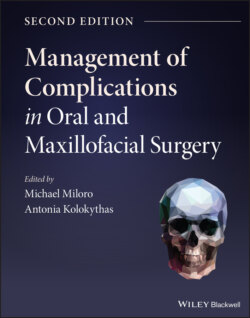Читать книгу Management of Complications in Oral and Maxillofacial Surgery - Группа авторов - Страница 37
Acute Vascular Events
ОглавлениеAcute vascular events are among the most serious perioperative complications and include myocardial ischemia, MI, and cerebrovascular accident (stroke). Due to the high prevalence of cardiovascular and atherosclerotic diseases in adults, complications of this nature should be anticipated in any office emergency plan.
Myocardial ischemia and MI are most common in the postoperative period [16] and can be related to the surgical procedure, the anesthesia, or both. In a very anxious patient with a history of ischemic heart disease, the preoperative period presents a risk of acute angina. Risk factors for acute vascular events include history of heart disease or cerebrovascular disease, increasing length and invasiveness of surgery, and significant changes in heart rate, respiration, or blood pressure due to anesthetic drugs or surgical manipulation. Though profound fluctuations in heart rate, blood pressure, or respiration should be avoided in any patient, this is critical for individuals with underlying risk factors for acute coronary or cerebrovascular complications. In these patients, vital signs should be maintained close to baseline to avoid hemodynamic decompensation.
Acute angina is characterized by a sensation of pain, tightness, or crushing in the substernal region of the chest and may be accompanied by shortness of breath, anxiety, and diaphoresis. It can be difficult to differentiate acute angina from a panic attack or GERD/acute gastritis unless the patient has a history of angina episodes. Acute angina should be treated by discontinuing any stimulating procedure, administering a dose of sublingual nitroglycerin, applying supplemental oxygen via face mask or nasal cannula, and continuous monitoring of vital signs. (Because nitroglycerin can lower blood pressure, it should not be given if hypotension is present. Also, it is contraindicated in patients who have recently taken phosphodiesterase inhibitor medications such as sildenafil.) If the pain does not subside completely within 10 minutes, a second dose of nitroglycerin may be given. Up to three doses of nitroglycerin have been recommended to alleviate symptoms of angina, but the surgeon should take into account the patient's medical history and level of distress in deciding when to call EMS (emergency medical services). It is recommended that EMS be notified immediately and that emergency medical drugs and supplies be readily available (advanced cardiac life support [ACLS] protocol) in cases of moderate to severe chest pain lasting 30 minutes or more, when the pain appears to be getting worse, if two to three doses of nitroglycerin are not sufficient to provide relief, and in any patient who is hemodynamically unstable.
In situations where a MI is suspected, the patient should be given 325 mg of aspirin (chewed or crushed is preferable as it speeds absorption of the drug), sublingual nitroglycerin, and supplemental oxygen. If morphine is available, this should be given as well, both for pain relief and because it causes peripheral vasodilation, which enhances cardiac output. The patient's vital signs should be monitored continuously until EMS arrives, particularly the ECG (arrhythmias may accompany myocardial ischemia and can signal imminent cardiac arrest) and blood pressure. If the patient deteriorates to a situation of cardiac arrest, the ACLS protocol should commence without delay. (NB: Adequate and uninterrupted chest compressions are now recognized as a key to successful resuscitation efforts. If the patient is in a dental chair without a hard, flat back or that does not recline completely, it is preferable to place the patient on the floor so that adequately forceful chest compressions can be delivered against a firm supporting surface.)
The management of a patient where stroke/cerebrovascular accident is suspected includes notification of EMS and supportive measures. Supplemental oxygen should be given and the patient's vital signs monitored. A brief neurological examination may distinguish true cerebrovascular complications from confusion or disorientation that may result from anesthetic drugs. Aspirin should not be given to a patient suspected of suffering a stroke because intracerebral hemorrhage may be present. Patients who develop signs of neurocognitive deficit in the setting of severe hypertension (systolic >200 mmHg, diastolic >110 mmHg) should be treated with medication to decrease blood pressure. Of the IV agents, labetalol (a combination alpha‐ and beta‐blocking agent) is frequently preferred for the management of acute severe hypertension (see the section on hypotension and hypertension).
